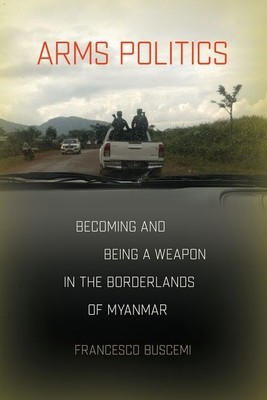
- We will send in 10–14 business days.
- Author: Francesco Buscemi
- Publisher: Southeast Asia Program Publications
- ISBN-10: 1501781731
- ISBN-13: 9781501781735
- Format: 15.2 x 22.9 x 2.1 cm, kieti viršeliai
- Language: English
- SAVE -10% with code: EXTRA
Reviews
Description
In Arms Politics, Francesco Buscemi tells the story of the ceasefire, disarmament, and rearmament of the Ta'ang movement in Myanmar's Shan State through an analysis of the formation of the Palaung State Liberation Front/Ta'ang National Liberation Army. With a focus on the circulation of weapons through the post-1991 ceasefire, disarmament, and rearmament years, Buscemi explores how "becoming and being" an armed force leads to the "becoming and being" of a rebel polity.
Francesco Buscemi argues that the governance of arms and weaponry by rebel movements such as the PSLF/TNLA shapes historically and spatially complex relationships among leadership, rank-and-file, civilians, and civil society groups. Furthermore, he demonstrates that it is through the acquisition of weapons and the governing of armed collectives that rebel movements reproduce and shape the collective identity of their polity and its political geography. Against the backdrop of the world's longest ongoing armed conflict, Arms Politics shows how the processes and practices of governing weapons shape social and spatial relations of rule at the edges of state authority.
EXTRA 10 % discount with code: EXTRA
The promotion ends in 23d.18:39:29
The discount code is valid when purchasing from 10 €. Discounts do not stack.
- Author: Francesco Buscemi
- Publisher: Southeast Asia Program Publications
- ISBN-10: 1501781731
- ISBN-13: 9781501781735
- Format: 15.2 x 22.9 x 2.1 cm, kieti viršeliai
- Language: English English
In Arms Politics, Francesco Buscemi tells the story of the ceasefire, disarmament, and rearmament of the Ta'ang movement in Myanmar's Shan State through an analysis of the formation of the Palaung State Liberation Front/Ta'ang National Liberation Army. With a focus on the circulation of weapons through the post-1991 ceasefire, disarmament, and rearmament years, Buscemi explores how "becoming and being" an armed force leads to the "becoming and being" of a rebel polity.
Francesco Buscemi argues that the governance of arms and weaponry by rebel movements such as the PSLF/TNLA shapes historically and spatially complex relationships among leadership, rank-and-file, civilians, and civil society groups. Furthermore, he demonstrates that it is through the acquisition of weapons and the governing of armed collectives that rebel movements reproduce and shape the collective identity of their polity and its political geography. Against the backdrop of the world's longest ongoing armed conflict, Arms Politics shows how the processes and practices of governing weapons shape social and spatial relations of rule at the edges of state authority.


Reviews